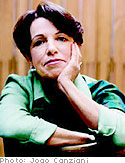Love Among the Ruins

It's been six months since the tsunami swept away their houses, villages, families, livelihoods. How are the survivors doing? Child psychiatrist Lynne Jones, who went to help, reports on children who still wake up crying and grown-ups who are struggling to rebuild their lives and transcend the unthinkable. She's awed by their amazing grace. The following are excerpts from her article in this month's O, The Oprah Magazine.
Lamno, Aceh Province, Sumatra, Indonesia, February 3–5, 2005I have spent these days listening and talking with women and children at the International Medical Corps (IMC) clinic and in the small clusters of informal camps that surround it. I am a child psychiatrist, and IMC has sent me here to conduct a mental health assessment and start up a program. Maureen, our volunteer practice nurse, wanted me to see four very frightened children. When I arrived in the morning, there were some nine mothers and around 30 children. So we created an ad hoc group.
The mothers each told a similar story. They suffer from aches and pains and palpitations. Their children, all under 12, are jumpy and very easily startled; they wake at night, they cling, they cry. One wets his bed, one runs away, one little girl with downcast eyes scarcely speaks. One falls unconscious and rolls around—but he did this before the tsunami. These last two children appear to have more serious problems, so I will see them individually. For the rest we begin on what is best described as a fear reduction workshop, starting with the premise that understanding something and being informed about it makes it less frightening.
Lamno, May 6
This morning I went back to Ujung Muluh. The devastated landscape is transformed. Monsoon rains have turned the brown to green, and small, impromptu communities have regrown on old foundations all across the flood plain.
On the spot near the village well, there was a newly constructed meetinghouse. This was the first place we put up, a thin man told me, as we sheltered from a downpour. Tents now sprout on the wrecked soccer field with a small volleyball court nearby. Other houses are strange hybrids of canvas and wood. Oxfam has strung up electric cable. The men hope another agency will rebuild their boats. The thin man told me he had lost his entire family: wife, mother, father, parents-in-law, sister, nephew, and his own daughters, ages 12 and 9.
"I want to be here," he said. "It is where I feel closest to them."
People are coming home.
How You Can Still Help
- Oprah's Angel Network has teamed up with three worldwide relief and development organizations working in the area of Arugam Bay and the town of Pottuvil, Sri Lanka and has donated $1 million to help in their efforts. Learn more about the organizations or make a donation to Oprah's Angel Network
- International Medical Corps (IMC), a nonprofit humanitarian organization founded in 1984 by volunteer doctors and nurses, provides emergency assistance around the world. It also trains local medical staff to carry out the healing work themselves and supports lasting improvements in healthcare. IMC—'a presence in Indonesia four years before the recent disaster—has a long-term commitment to tsunami victims there and in Sri Lanka. Visit www.imcworldwide.org or call 800-481-4462.



